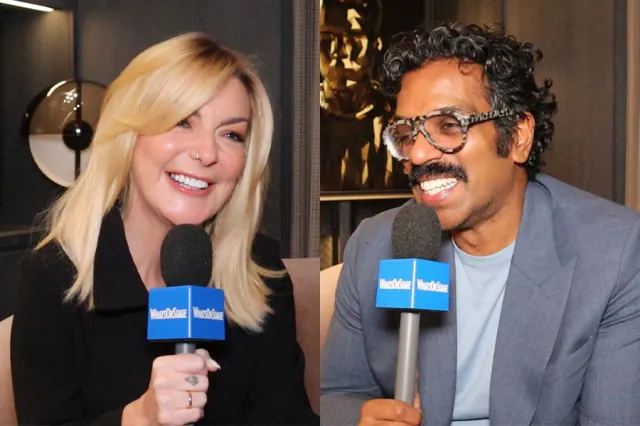Hare Spooks Nighy on TV
David Hare‘s first television film for two decades, Page Eight, was a major occasion on Sunday night, and one that fully deserved our attention and applause, not least because scripts in native television drama (The Hour, for instance?) are usually so terrible.
Every scene in this tale of spooks, government cover-ups, strained personal relationships and a dodgy dossier was fully wound up and followed through, although you wondered a little what the future had in store for Ewen Bremner’s gay Financial Times correspondent who was “out there” for Bill Nighy‘s stealthy, sharp-suited MI5 intelligence officer.
Nighy’s boss, best friend and former Cambridge tutor was played with rumbling, mischievous gravitas by Michael Gambon until he dropped dead, apparently after eating a fried egg.
Otherwise, he let Nighy off the leash tracking the truth behind the murder of a British protestor in Palestine whose sister, sumptuously played by Rachel Weisz, happened to live across the landing in Nighy’s block of mansion flats. Gambon had also married one of Nighy’s former wives, another big favour.
Nighy’s daughter by that wife, played by the beautifully sullen Felicity Jones, was a troubled conceptual artist who had fallen out with dad and was suddenly pregnant by an “unsuitable” bohemian.
Nighy had to wrestle with this, as well as the cover-up, and he did so while fending off the brusque interventions of a brutish Home Secretary (brilliantly done by Saskia Reeves) — with whose married Whitehall sidekick, Holly Aird, he was conducting an affair — and the sharp impatience of Ralph Fiennes as a deeply unsavoury Prime Minister.
What was so clever and engaging about all this was the way in which Hare touched on so many facets of our recent history on the interface between politics, the intelligence services and public fears and paranoia without once naming names or quoting quotes.
In Nighy’s character, Johnny Worracker, we had a man whose professional default mode of evasiveness and deception had leaked into his private life to such an extent that he hadn’t even noticed. The film charted this crisis in a manner both highly charged and seriously subtle, and Nighy’s performance — cool, taut, humorous and resolutely square-jawed — was a masterpiece of ironic understatement and growing self-awareness.
And he even got to share a hotel bedroom with Rachel Weisz without so much as making the slightest move. How cool is that?
Great cast, great script. And Hare’s own direction, in a series of fluently managed locations, washed in blue twilight and confidently arranged in offices, art galleries, a Cambridge college for high table and low deals in a panelled recess, was perfectly judged and paced. Nice soundtrack, too, by Paul Englishby.
I was fully expecting something good, but not this good, after hearing the film rubbished with breathtaking condescension on BBC Radio 4’s Saturday Review. One of the critics — I think it was the novelist Louise Doughty (once a theatre critic on the Mail on Sunday) — weakly suggested, as a kind of head-patting sop, that, well, at least it was a piece of contemporary drama, which made a nice change, before the chairman Tom Sutcliffe rejoined that what a shame, it was therefore, that “they” (the BBC? the sop-handlers? MI5?) had got David Hare to write it…
I simply couldn’t believe my ears. One of the other critics, the sportswriter Jim White, made an even more hilarious statement to the effect that Hare had somehow overlooked the fact that we all worked on computers these days and that the fate, therefore, of a missing file was both ludicrous and unbelievable as a concept.
We did indeed see people in offices working on computers. But the point here was surely that some “dodgy dossier” things are just to hot to be committed to the internet and the blogosphere. That was the premise of the whole drama.
And yes, folks, it was a drama. It wasn’t a documentary. Perhaps we’ve just lost the habit of expecting “make believe” on television, just as we’ve lost the habit, judging by one or two of the other critical reactions, of listening to dialogue on the small screen that aims a bit higher than EastEnders or Casualty.












